Budget 2021: A Canada-wide Early Learning and Child Care Plan
Backgrounder
The pandemic has made access to early learning and child care a universal issue that is resonating across sectors, regions, and income brackets. School and child care centre closures have been difficult for parents. Some have had to leave their jobs, or reduce their hours significantly. Without access to child care, parents cannot fully participate in our economy.
This is an economic issue as much as it is a social issue. Child care is essential social infrastructure. It is the care work that is the backbone of our economy. Just as roads and transit support our economic growth, so too does child care.
Investing in early learning and child care offers a jobs-and-growth hat trick: it provides jobs for workers, the majority of whom are women; it enables parents, particularly mothers, to reach their full economic potential; and it creates a generation of engaged and well prepared young learners.
Studies by Canadians Dr. Fraser Mustard and the Honourable Margaret McCain have shown that early learning is at least as important to lifelong development as elementary, secondary, and post-secondary education—it improves graduation rates, promotes lifelong well-being, boosts lifetime earnings, and increases social equity.
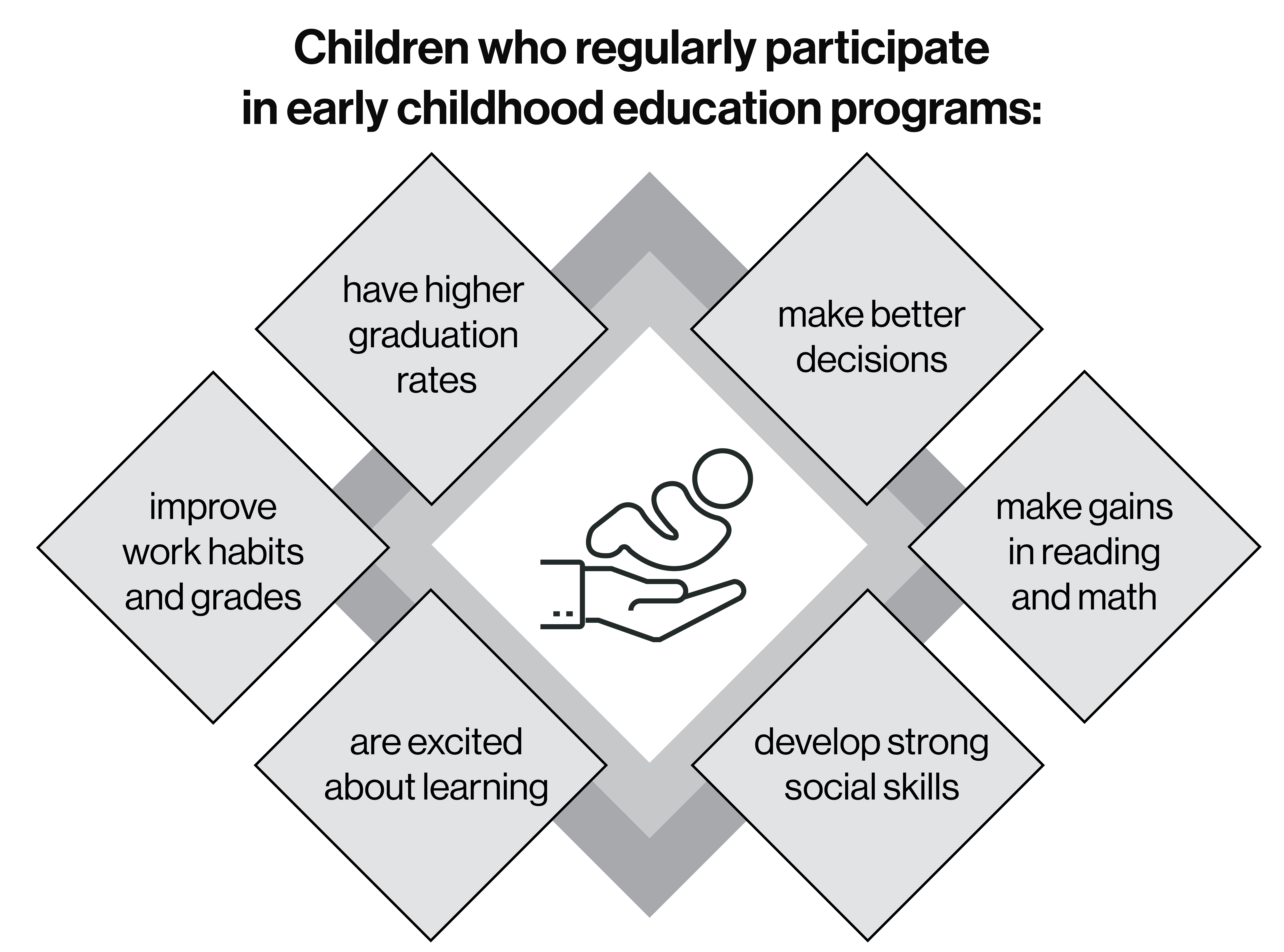
Early learning and child care can be more expensive than university tuition in some cities—something families have decades longer to save up for. The pandemic has shifted the public understanding of how access to child care supports children, their families, and our economy. The clear benefits of early learning and child care should not be a luxury for only the Canadian families that can afford it. Lack of access is not a choice, nor are unaffordable fees. The current system is leaving too many children and families behind, particularly low-income and racialized families. Every child deserves a fair start.
The high cost of child care—in some urban centres fees for one child can be as much as rent or mortgage payments—is a tax on a segment of the population that Canada requires to drive economic growth. Young families are juggling sky high housing costs, the increasing cost of living, expected to save up for their retirements, while managing child care fees.
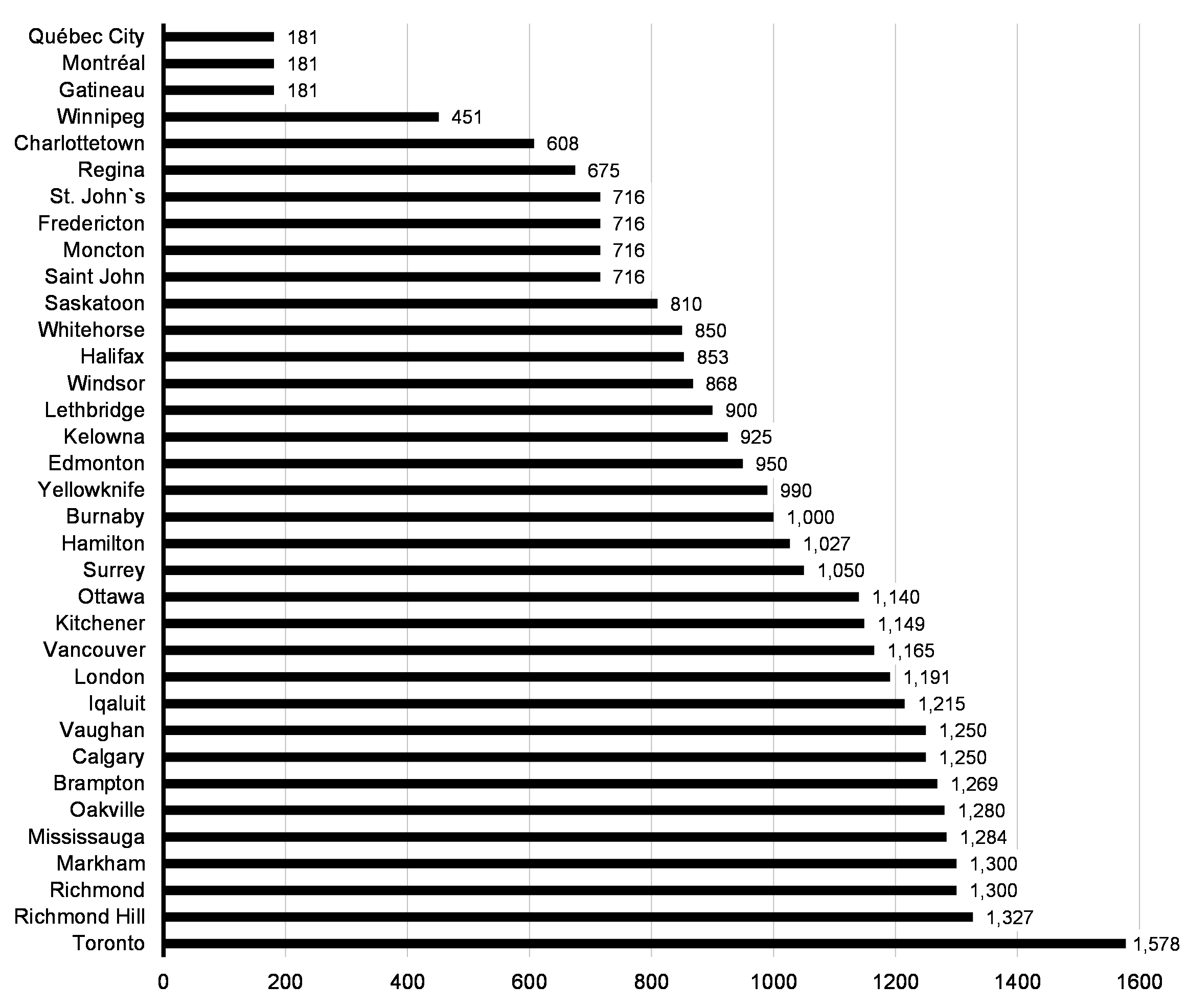
The very best example of the economic power of an affordable, well-run early learning and child care system is Quebec. At the time the Québec Educational Childcare Act was instituted in 1997, women's labour force participation rate in Quebec was four percentage points lower than the rest of Canada. Today it is four points higher. And Quebec women with children under three have some of the highest employment rates in the world. Furthermore, studies show that child care alone has raised Quebec's GDP by 1.7 per cent.
TD Economics has pointed to a range of studies that have shown that for every dollar spent on early childhood education, the broader economy receives between $1.50 and $2.80 in return.
A Canada-wide early learning and child care plan is a plan to drive economic growth, a plan to secure women's place in the workforce, and a plan to give every Canadian child the same head start. It is a plan to build an economy that is more productive, more competitive, and more dynamic. It is a plan to grow the middle class and help people working hard to join it.
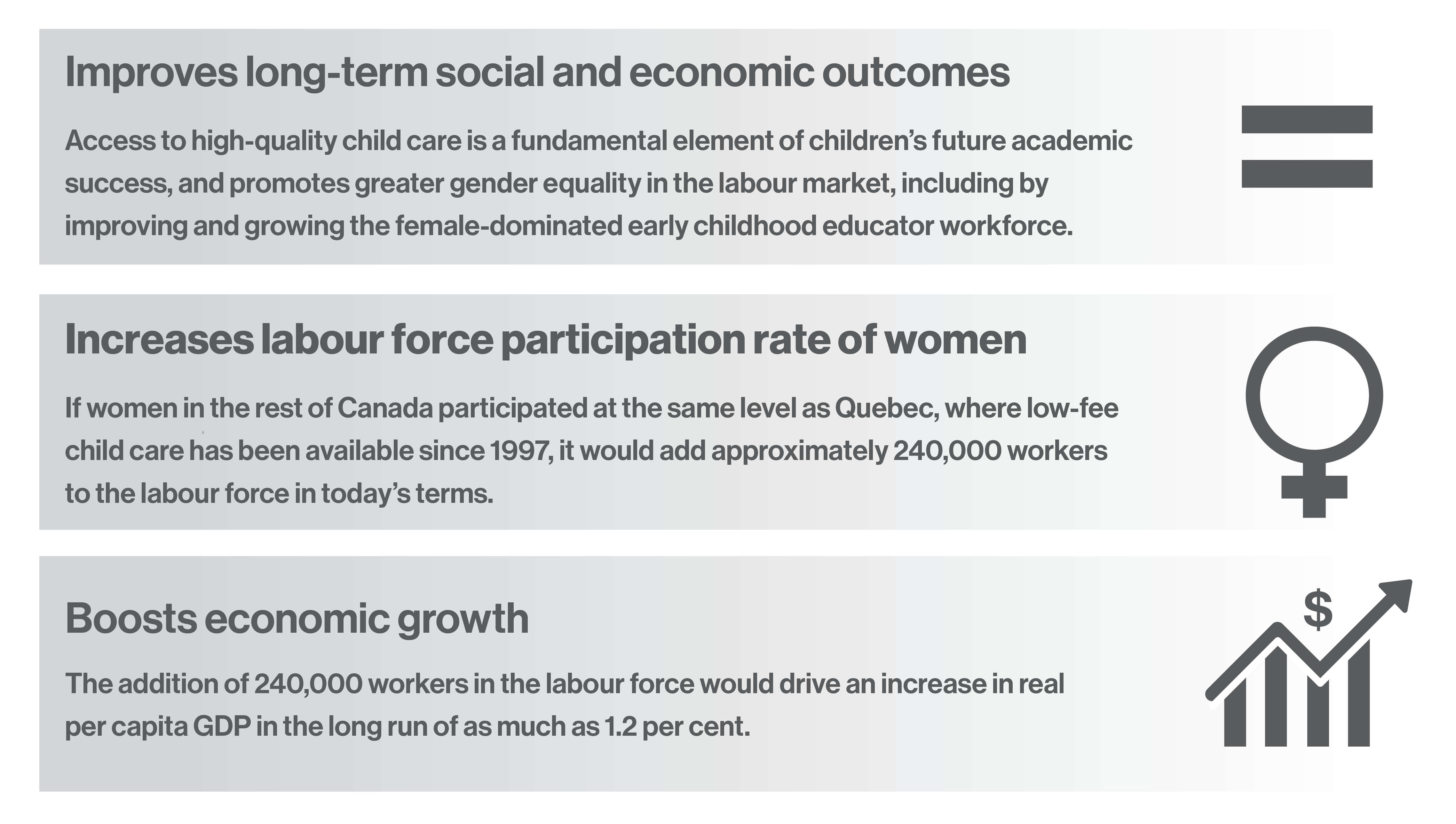
Establishing a Canada-Wide Early Learning and Child Care System
The federal government will work with provincial, territorial, and Indigenous partners to build a Canada-wide, community-based system of quality child care. This will be a transformative project on a scale with the work of previous generations of Canadians, who built a public school system and public health care. This is a legacy investment for today's children who will not only benefit from, but also inherit this system.
Just as public school provides children with quality education in their neighbourhoods, the government's goal is to ensure that all families have access to high-quality, affordable, and flexible early learning and child care no matter where they live. The government will also ensure that families in Canada are no longer burdened by high child care costs—with the goal of bringing fees for regulated child care down to $10 per day on average within the next five years. By the end of 2022, the government is aiming to achieve a 50 per cent reduction in average fees for regulated early learning and child care to make it more affordable for families. These targets would apply everywhere outside of Quebec, where prices are already affordable through its well-established system.
To support this vision, Budget 2021 proposes new investments totaling up to $30 billion over the next five years, and $8.3 billion ongoing for Early Learning and Child Care and Indigenous Early Learning and Child Care, as outlined below.
Combined with previous investments announced since 2015, a minimum of $9.2 billion per year ongoing will be invested in child care, including Indigenous Early Learning and Child Care, starting in 2025-26, with a future objective of reaching a 50/50 cost share with provinces and territories.
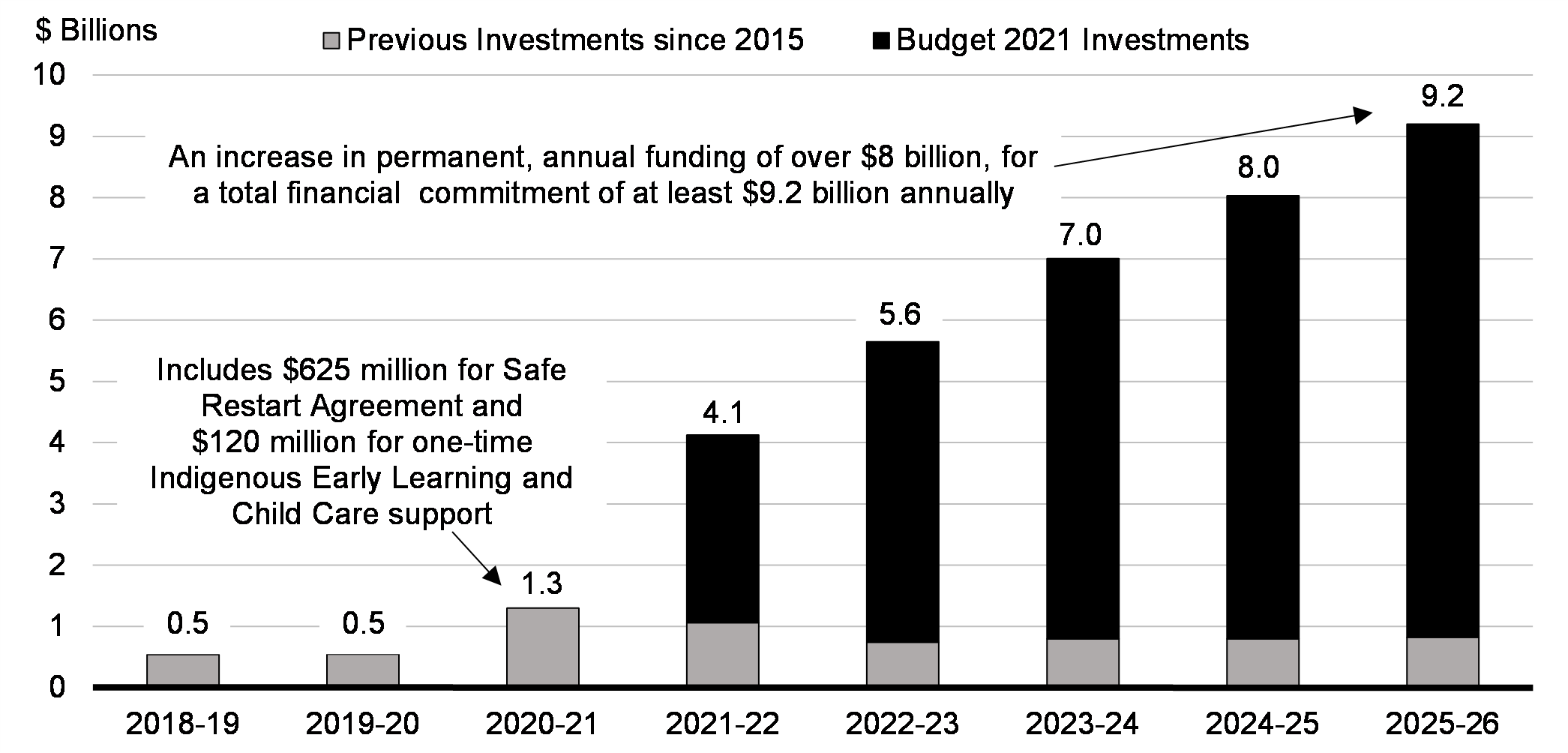
Over the next five years, the government will work with provinces and territories to make meaningful progress towards a system that works for families.
Budget 2021 proposes to invest up to $27.2 billion over five years, starting in 2021-22 as part of initial 5-year agreements. Future objectives and distribution of funding, starting in year six, would be determined based on an understanding of need and progress achieved as part of this initial plan.
Federal funding would allow for:
- A 50 per cent reduction in average fees for regulated early learning and child care in all provinces outside of Quebec, to be delivered before or by the end of 2022.
- An average of $10 a day by 2025-26 for all regulated child care spaces in Canada.
- Ongoing annual growth in quality affordable child care spaces across the country, building on the approximately 40,000 new spaces already created through previous federal investments.
- Meaningful progress in improving and expanding before- and after-school care in order to provide more flexibility for working parents.
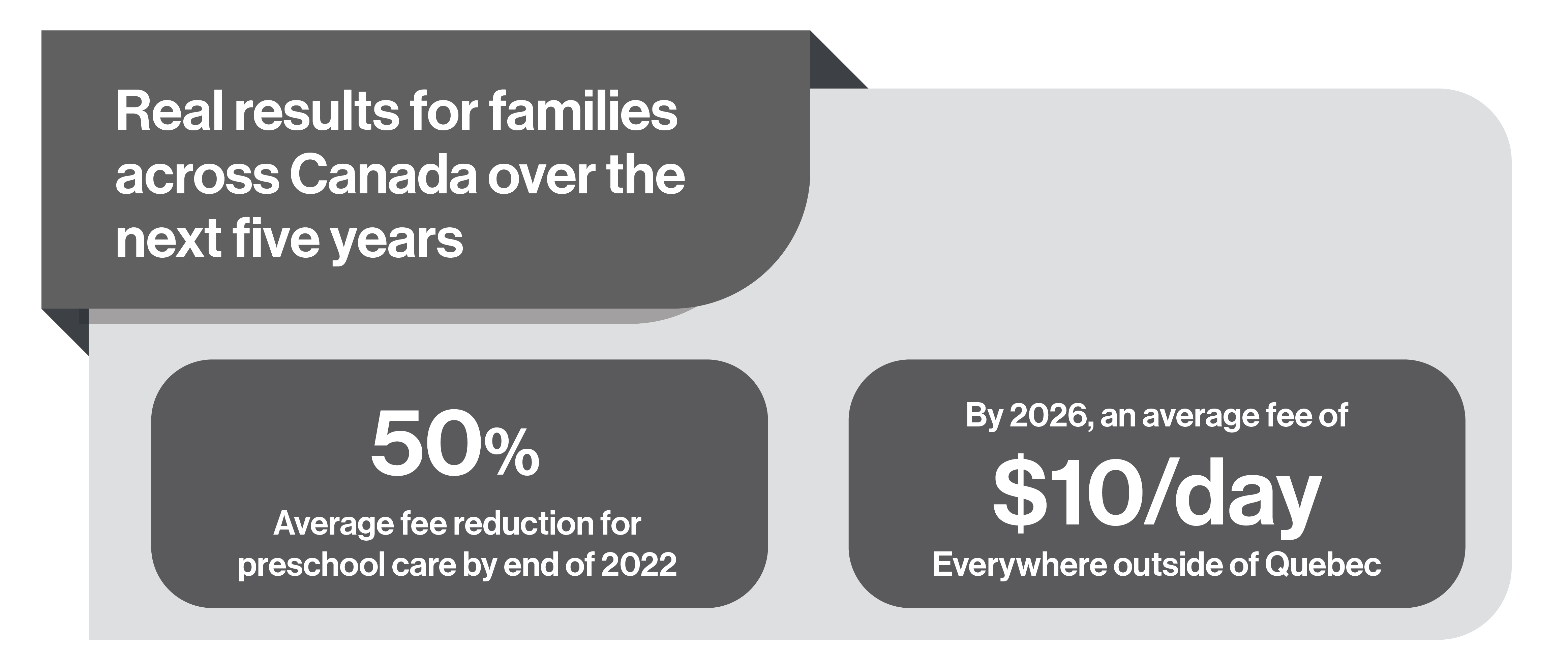
The next five years of the plan will focus on building the right foundations for a community-based and truly Canada-wide system of child care. This includes:
- Working with provinces and territories to support primarily not-for-profit sector child care providers to grow quality spaces across the country while ensuring that families in all licensed spaces benefit from more affordable child care.
- A growing, qualified workforce—with provincial and territorial partners, the government will work to ensure that early childhood educators are at the heart of the system, by valuing their work and providing them with the training and development opportunities needed to support their growth and the growth of a quality system of child care. Over 95 per cent of child care workers are women, many of whom are making low wages, with a median wage of $19.20 per hour.
- A strong basis for accountability to Canadians—the government will work with provincial and territorial partners to build a strong baseline of common, publicly available data on which to measure progress, report to Canadians, and help continuously improve the system.
Quebec has been a pioneer of early learning and child care in Canada, with outcomes for children and families that have been studied around the world. However, the Quebec experience has also illustrated that building a system is complex, and that phased and sustained investments are required to ensure that everyone has access to the same quality of care at affordable prices. These are valuable lessons for a pan-Canadian system. To build on the current bilateral agreements:
-
Budget 2021 proposes to proceed with an asymmetrical agreement with the province of Quebec that will allow for further improvements to their system, which the people of Quebec are rightly proud of.
In addition, the federal government will authorize the transfer of 2021-22 funding as soon as bilateral agreements are reached with the provinces and territories, enabled by a proposed statutory appropriation.
Supporting Accessible Child Care Spaces
For families that have children with disabilities, it is often challenging to find affordable and accessible child care spaces that meet their needs.
-
To make immediate progress for children with disabilities, Budget 2021 proposes to provide $29.2 million over two years, starting in 2021-22, to Employment and Social Development Canada through the Enabling Accessibility Fund to support child care centres as they improve their physical accessibility. This funding, which could benefit over 400 child care centres, would support improvements such as the construction of ramps and accessible doors, washrooms, and play structures.
Addressing the Needs of Indigenous Families and Communities
Early learning and child care programs designed by and with Indigenous families and communities give Indigenous children the best start in life. This is a critical part of reconciliation.
Canada's Indigenous Early Learning and Child Care Framework, co-developed with Indigenous partners in 2018, adopts a distinctions-based approach to strengthening high-quality, culturally appropriate child care for Indigenous children guided by Indigenous priorities.
-
Budget 2021 builds on this framework, and on recent investments in the 2020 Fall Economic Statement, to continue the progress towards an early learning and child care system that meets the needs of Indigenous families, wherever they live, with a proposed investment of $2.5 billion over the next five years.
Bringing Partners Together to Build and Maintain a Canada-Wide Child Care System
This plan requires strong leadership from the federal government—built on an open and collaborative relationship with partners and stakeholders in order to meet the needs of families. Early learning and child care investments in Budget 2017 brought all provinces and territories into bilateral agreements that have been successfully delivering results driven by quality, accessibility, and affordability. These shared priorities will be the platform for the development of a quality pan-Canadian system.
-
Building on recent investments in the 2020 Fall Economic Statement, an additional $34.5 million over five years, starting in 2021-22, and $3.5 million ongoing, would be provided to Employment and Social Development Canada to strengthen capacity within the new Federal Secretariat on Early Learning and Child Care.